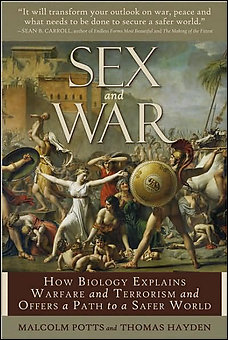 Sex and War: How Biology Explains Warfare and Terrorism and Offers a Path to a Safer World by Malcolm Potts
Sex and War: How Biology Explains Warfare and Terrorism and Offers a Path to a Safer World by Malcolm Potts
Malcolm Potts explores the questions concerning the biological connections of actions such as war and sex. Potts has a broad background in working with various organizations world wide including war-torn and Third world countries. As a scientist and obstetrician, Potts has worked with governments and aid organizations globally, and in the trenches with women who have been raped and brutalized in the course of war. Combining their own experience with scientific findings in primatology, genetics and anthropology, Potts and Hayden explain war’s pivotal position in the human experience and how men in particular evolved under conditions that favored gang behavior, rape and organized aggression. Drawing on these new insights, they propose a rational plan for making warfare less frequent and less brutal in the future.[Quoted freely from the publisher's website.]
Potts believes t hat warlike behavior (warfare and terrorism) requires a “special sort of violence in men” and he calls it “team aggression.” When one shifts through some of the constant political rhetoric, there is an interesting analysis of the biological nature of aggression. Women, for the most part, do not fall into the definition of team aggression and have often, according to the authors, been the target of sexual and physical aggression by men. We fight over limited resources such as oil. We need to reduce the need for conflict by reducing the need for such limited resources.
However, the book is significantly flawed in my opinion. For example, in the final chapter the authors attempt to produce a scenario where we can overcome our predisposition for group aggression (reminds me of the Group Think mentality I use when discussing the horrors of Nazi death camps.) The authors suggestion for “containing” war and terrorism is simplified to a bullet list of actions:
- Empower women with education and opportunities.
- Increase the number of women in parliaments and legislatures.
- Enable women to have the means to manage whether and when to have a child.
- Help people prevent unintended pregnancies.
- Ensure Universal secular, scientific education.
- Encourage knowledge of history and an understanding of our evolution from other animals.
- Develop and maintain a free media.
- Avoid supplying weapons to potential enemies.
An interesting list. Where to begin. The author’s vast experiences abroad (he worked with rape victims in war torn countries) has clearly impacted his objectivity, and who can blame him. However, the first bullet point applies to only those third world and war torn countries, as do most of these points. Where in the United States are women not empowered to educate themselves, manage their child production, ect. Also, the complete absence of Christianity and religion, instead we are encouraged to teach an “understanding of our evolution from other animals…” Now how does this help us? How do I as a teacher make this work? I have no clue! I know, they have data, research, ect.
The authors do clearly acknowledge that soldiers and warriors are also made by their environment. I also agree with knowing our history, so long as it is not presented within the framework of Progressivism or Social Justice. The Press is also key, it was meant to be an entity that help the government accountable, and clearly today that is questionable. Finally, avoid sending weapons to our potential enemies, now that is one that makes complete sense.
All and all I am dumbfounded they sent me this book. I didn’t care for the consistent political punditry and the book comes off as theoretical fantasy that will never be and could never be! The authors utterly fail to prove to this reviewer that they have offered any kind of path to a “safer world”!